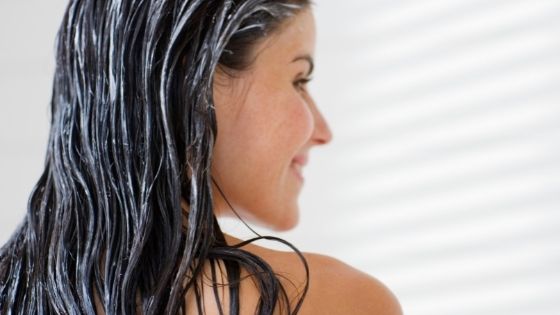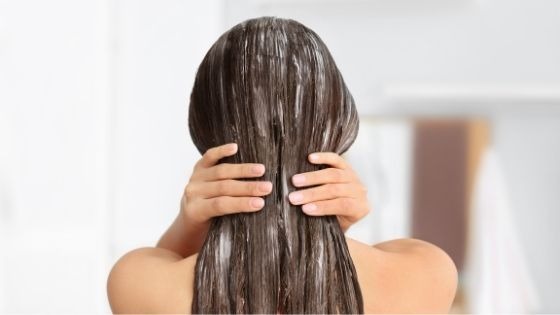Can you leave the conditioner in your hair overnight?

Can you leave the conditioner in your hair overnight? It is not recommended. Chemicals in conditioner can be dangerous to your scalp and follicles if they stay on your hair for a long time.
It is best to use a small amount of the product that will only be on your hair for a short time. If you rinse out your conditioner, it will make your hair more healthy. In addition, water seals in some of the moisture and doesn't hurt your mane.
Deep conditioners should only be left on for around five minutes to help your hair maintain its health. Some conditioners should never be applied to the scalp, which means they shouldn't be left in for any amount of time.
- How do conditioners work?
- How do I use conditioner in my hair?
- What happened when I left the conditioner in my hair overnight?
- Overnight conditioning: Helpful or Harmful?
- The risks of leaving the conditioner in your hair too long
- What deep conditioner to choose according to your hair type
- What to look for when buying a deep conditioner?
- Disadvantages of leaving shampoo and conditioner in your hair overnight
- How do I deal with hygral fatigue?
- Tips to have the finest and healthiest hair
- How long is it safe to leave the conditioner in your hair?
- Conclusion
How do conditioners work?
Conditioners typically work to restore the hair's hydration, improve manageability and reduce frizziness. They penetrate the hair shaft, which helps your brittle and dry hair to heal.
Conditioners work by coating your hair strands with emollients and film formers for protection and moisture retention until the next washing cycle.
They keep your hair soft, enhance and retain color, and they will keep your scalp free of dandruff.
They have a lot of good things inside them. For example, the conditioners will help your hair grow and turn into a healthy, shiny hair.
They also help remove buildup from your scalp, and they make your hair look shiny and smooth.
Proper use will provide overall conditioning for healthier, happier tresses!
How do I use conditioner in my hair?

Conditioner is essential in a good hair care routine. It is not like shampoo that you wash out after you've used it in your hair. Instead, let the conditioner stay in your hair for at least five minutes.
That will allow the benefits of the conditioner to work its way into your hair, no matter if you have curly or straight hair.
However, if you have a lot of tangles and knots in your hair, it would be best to apply a bit of shampoo to your hair to help make the process easier for you.
What happened when I left the conditioner in my hair overnight?
Leaving hair products in your hair for an extended period can make the hair brittle and itchy from too much moisture. In addition, a lot of product buildup can cause unmanageable clumps and tangles.
If you have susceptible skin, leaving the conditioner in your hair overnight can cause a red rash to appear on your skin.
Overnight conditioning: Helpful or Harmful?
Overnight conditioning can cause excessive breakage and frizzies, so you must carefully monitor it. Good to swim in conditioner or put an overnight deep oil treatment in before bed.
After showering, remove all the conditioner so that you have a clean slate for styling the next day!
The risks of leaving the conditioner in your hair too long
Here are the basics of what you need to know. Conditioner has two functions.
- One is to moisturize your hair and smooth it out so that it's not frizzy and dry-looking.
- The other reason it exists is as a lubricant for combing, which reduces breakage and keeps your hair neat and manageable.
Conditioner also has several other ingredients for their presumed benefits. In some cases, those can do good things.
If you don't rinse your hair after washing it with shampoo, the ingredients stay in your hair and build up over time. If this happens, you might end up with too many products in your hair, or it will feel gross.
These additional ingredients also don't moisturize your hair to the degree that you might assume.
Conditioners act like masks or leave-in conditioners. You can leave this in your hair without rinsing it out.
However, if your conditioner isn't formulated in this way, you cannot leave it in your hair overnight.
The most common risk with leaving the conditioner in is that the additional ingredients may harm your hair.
These risks include the buildup of product overload, which can lead to greasiness or funkiness, and potential health risks depending on the product's ingredients.
In terms of health concerns, hair care products may contain several ingredients that could pose a risk. These include but aren't limited to:
- Sodium Lauryl Sulfate (a synthetic surfactant)
- Parabens (synthetic preservatives)
- Potential carcinogens and endocrine disruptors (usually due to fragrance and color additives)
If you're using many hair products and experience buildup, or if the ingredients don't seem compatible with your body, you may experience breakouts or skin irritation. It's not guaranteed that this will happen, but it is possible.
What deep conditioner to choose according to your hair type
The first thing you should know before buying a deep conditioner is your natural hair type.
Dry hair
Use a rich, sulfate-free shampoo and focus on hydrating the hair. Next, use a rich conditioner or creamy masque to help rehydrate and replenish moisture to the hair.
Normal hair
Use a sulfate-free shampoo and a creamy conditioner. A good one is the Ouidad Moisture Lock Leave-In Conditioner.
Oily hair
You have to tame oiliness with a water-soluble, sulfate-free shampoo. Then, use a light conditioner to remove buildup and prevent hair from feeling heavy.
Damaged hair
Use a gentle sulfate-free shampoo to remove the product and reduce damage caused by heat styling tools.
Chemically-treated hair
Rebuild damaged hair with hydrating products that are free of silicones, sulfates, phthalates, and parabens.
For split ends
Hydrate split ends with a creamy conditioner. For a DIY deep conditioning treatment, you could try using a plain yogurt mask.
What to look for when buying a deep conditioner?
There are two main things to consider when choosing a deep conditioner: The ingredient list and the way it makes your hair feel.
The ingredients of the product will determine what you're putting on your hair and how it will affect it. You should also consider whether or not you like the way that conditioner makes your hair feel.
As we mentioned before, some of the most common things to look out for in a deep conditioner are:
Sodium Lauryl Sulfate (a synthetic surfactant) This may cause your hair to become stiff and feel dry. Parabens (synthetic preservatives) might cause skin irritation or be a potential carcinogen.
Potential carcinogens and endocrine disruptors (usually due to fragrance and color additives) might cause skin irritation and disrupt hormonal balance.
What you're looking for is a natural, plant-derived deep conditioner that doesn't contain any harmful ingredients, like Kiel's Deep Penetrating Hair Revitalizer.
How to use:
- Applying a hair mask
- Wash your hair with a gentle shampoo.
- Apply the deep conditioner to towel dry or dry hair, starting at the ends and working it upwards towards the roots.
- Leave in for 5-15 minutes before rinsing out with tepid water.
- Style as usual after thoroughly towel blotting.
Changing your hairstyle, getting a haircut to layer the hair, or adding in some highlights are all amazing options that can also change up your look while still feeling fresh!
Hair is an accessory to every outfit and you should show it off accordingly.
Disadvantages of leaving shampoo and conditioner in your hair overnight

Damaged hair
If you leave shampoo and conditioner in your hair overnight, it can cause damage to your hair.
One of the main reasons is because many shampoos contain sulfates, which strip the hair of its natural oils.
That means that when you wash it out in the morning, your hair will feel dry and lack volume.
Product overload
If you leave shampoo and conditioner in your hair overnight, it could lead to product overload.
This overload occurs when the products build up on your scalp and hair, leading to possible clogged follicles, which can cause breakouts or skin irritation.
It also means that there is a greater chance of your hair feeling heavy or appearing greasy.
How do I deal with hygral fatigue?
Hygral fatigue results from swelling or shrinking that can happen to human tissue, especially hair, muscles, and joints when the person goes from an environment with a lot of humidity to one that doesn't.
The opposite is true for plant material. When you bring it back into an environment with high humidity, it should dry out enough for this issue to correct itself.
It is essential to use a moisturizing shampoo and conditioner twice a week, as well as lightly brushing your hair with a natural bristle brush.
You can also use conditioning oils on damp or dry hair to rehydrate the strands from root to tip.
Tips to have the finest and healthiest hair
Now I will talk about my tips and home remedies on how to have the finest and healthiest hair or take care of your hair in general.
Lemon juice
You can use lemon juice to get shiny hair. It contains citric acid, which brightens the hair and helps eliminate any brassy tones in your color.
Just mix fresh lemon juice with water (3:1 ratio) and spray onto dry, unwashed hair before you head out into the sun.
Washing your hair with mayonnaise
Who doesn't love a good mayonnaise mask? It is rich in proteins and very moisturizing. In addition, you can use a combination of eggs, oil, milk, vinegar, mustard, and lemon juice help to soothe dry hair.
You will need about three tablespoons to 1/2 cup of mayo or one whole egg and 1/2 cup of mayonnaise.
Mix the ingredients, apply to your hair and scalp, and let it rest for 30 minutes before rinsing with lukewarm water.
Brushing your hair regularly.
Brushing your hair with a natural bristle brush or comb helps distribute the oils in your scalp through your hair. It also helps release tension in your neck and back.
Don't wash your hair every day.
The less you wash your hair, the better. Washing too much can strip your hair and scalp of natural oils, and this will cause dryness and damage.
If you use many products or heat on your hair and then wash it every day, you will waste all that product and energy. Instead, try to wait a couple of days before washing your hair.
Use coconut oil to bring back shine
Coconut oil is one of the best ingredients to treat dry hair or split ends. All you have to do is apply it directly to these spots and work through your hair, but quickly as heat can cause the coconut oil to solidify.
You could also try leaving a little bit on overnight, as the heat can help the oil penetrate deeper into your hair.
Rinse your hair in cold water
Rinsing your hair in cold water closes the cuticles and helps to retain moisture. It also makes your hair appear shinier.
Be careful with swimming pools.
If you plan to swim in a pool, make sure you rinse your hair with fresh water afterward. The chlorine can cause damage and lead to dryness.
Don't tie wet hair into tight ponytails or buns.
Another great way to avoid breakage is by ensuring that you don't wear your hair tied too tightly after washing.
It is essential to make sure that your hair can dry properly, and this means avoiding putting it into a tight ponytail or bun as soon as you get out of the shower.
Avoid towel drying your hair too much.
You will want to dry your hair a little, but overdoing it can cause damage. Also, try to avoid rubbing your hair with a towel as this can cause breakage and frizziness.
Do not brush wet hair.
Brushing wet hair is a big no-no! It can lead to breakage and split ends. It is best to wait until it has dried a little before you run a brush through your hair.
Avoid using hot irons or blow dryers too often.
While we know every girl loves to straighten her hair with a flat iron, using it on wet hair can be disastrous. The combination of heat and moisture can lead to severely damaged hair.
Do not change up your hair products too often.
While it is fun to try out new types of styling products, you will want to make sure that you don't change them too often. If the product isn't working for you, then go ahead and switch it out, but be careful!
Changing your hair products too often or using the wrong product can cause damage or dryness.
How long is it safe to leave the conditioner in your hair?
Not more than 30 minutes. Conditioners pre-treat your hair before you shampoo it. After applying the conditioner, please leave it in your hair for between 10 and 30 minutes. Then rinse thoroughly.
When you put conditioner on your hair, it locks in the moisture. It does this when combined with water from hydration or shampooing.
When you use conditioner, make sure you leave it on for a while so that natural oils can build up.
Shampooing your hair can make your hair less oily. However, it would be best if you waited for some time before you shampooed it.
If you have long, thick or curly hair or dry scalp, 20 minutes will be enough.
If you have dry hair, do not leave the conditioner in for longer than 10 minutes. That's the minimum time necessary to make a difference.
If you want soft hair, then apply the conditioner after shampooing and give it between 15 and 20 minutes to work before rinsing out thoroughly.
Conclusion
We do not recommend leaving the conditioner in your hair overnight. Depending on the type of hair care product and what other treatments you use, it may be difficult for all products to rinse out thoroughly before bedtime.
That can result in residue buildup that will cause less than desirable effects such as dryness or frizziness.
Also, we recommend shampooing every day because dirt and pollution accumulate quickly on the scalp.
That accumulation could lead to a variety of skin conditions, including acne breakouts and eczema flare-ups.
There are many reasons for not leaving your conditioner in too long, so enjoy those benefits today!
I hope this article was helpful to you. Now you can make a decision about your hair care regimen.
Medically reviewed and approved by Nataniel Josue M D.
